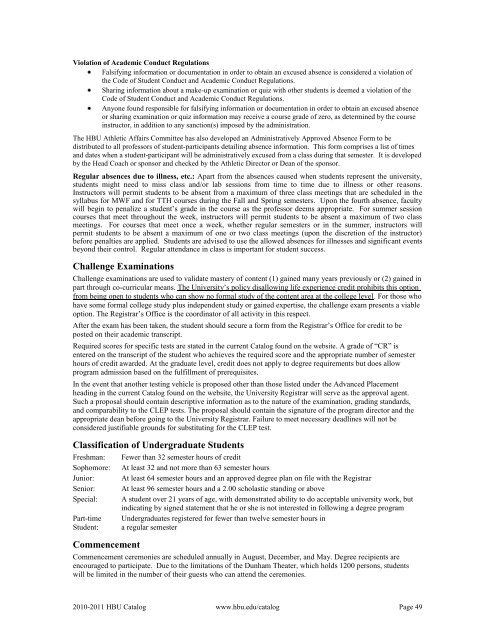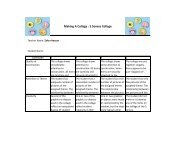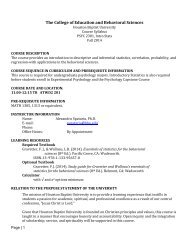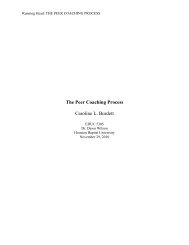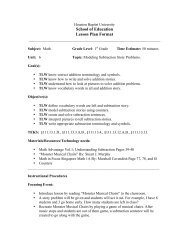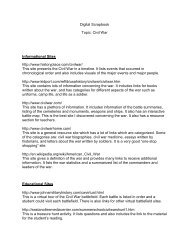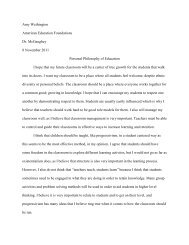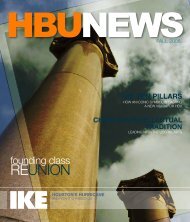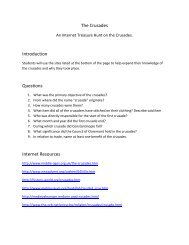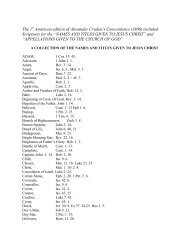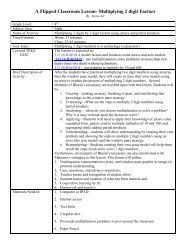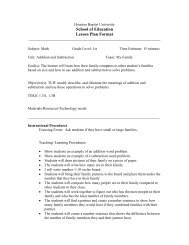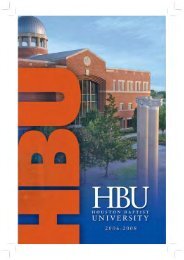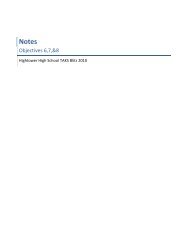2010-2011 HBU Catalog - Houston Baptist University
2010-2011 HBU Catalog - Houston Baptist University
2010-2011 HBU Catalog - Houston Baptist University
Create successful ePaper yourself
Turn your PDF publications into a flip-book with our unique Google optimized e-Paper software.
Violation of Academic Conduct Regulations<br />
Falsifying information or documentation in order to obtain an excused absence is considered a violation of<br />
the Code of Student Conduct and Academic Conduct Regulations.<br />
Sharing information about a make-up examination or quiz with other students is deemed a violation of the<br />
Code of Student Conduct and Academic Conduct Regulations.<br />
Anyone found responsible for falsifying information or documentation in order to obtain an excused absence<br />
or sharing examination or quiz information may receive a course grade of zero, as determined by the course<br />
instructor, in addition to any sanction(s) imposed by the administration.<br />
The <strong>HBU</strong> Athletic Affairs Committee has also developed an Administratively Approved Absence Form to be<br />
distributed to all professors of student-participants detailing absence information. This form comprises a list of times<br />
and dates when a student-participant will be administratively excused from a class during that semester. It is developed<br />
by the Head Coach or sponsor and checked by the Athletic Director or Dean of the sponsor.<br />
Regular absences due to illness, etc.: Apart from the absences caused when students represent the university,<br />
students might need to miss class and/or lab sessions from time to time due to illness or other reasons.<br />
Instructors will permit students to be absent from a maximum of three class meetings that are scheduled in the<br />
syllabus for MWF and for TTH courses during the Fall and Spring semesters. Upon the fourth absence, faculty<br />
will begin to penalize a student‘s grade in the course as the professor deems appropriate. For summer session<br />
courses that meet throughout the week, instructors will permit students to be absent a maximum of two class<br />
meetings. For courses that meet once a week, whether regular semesters or in the summer, instructors will<br />
permit students to be absent a maximum of one or two class meetings (upon the discretion of the instructor)<br />
before penalties are applied. Students are advised to use the allowed absences for illnesses and significant events<br />
beyond their control. Regular attendance in class is important for student success.<br />
Challenge Examinations<br />
Challenge examinations are used to validate mastery of content (1) gained many years previously or (2) gained in<br />
part through co-curricular means. The <strong>University</strong>‘s policy disallowing life experience credit prohibits this option<br />
from being open to students who can show no formal study of the content area at the college level. For those who<br />
have some formal college study plus independent study or gained expertise, the challenge exam presents a viable<br />
option. The Registrar‘s Office is the coordinator of all activity in this respect.<br />
After the exam has been taken, the student should secure a form from the Registrar‘s Office for credit to be<br />
posted on their academic transcript.<br />
Required scores for specific tests are stated in the current <strong>Catalog</strong> found on the website. A grade of ―CR‖ is<br />
entered on the transcript of the student who achieves the required score and the appropriate number of semester<br />
hours of credit awarded. At the graduate level, credit does not apply to degree requirements but does allow<br />
program admission based on the fulfillment of prerequisites.<br />
In the event that another testing vehicle is proposed other than those listed under the Advanced Placement<br />
heading in the current <strong>Catalog</strong> found on the website, the <strong>University</strong> Registrar will serve as the approval agent.<br />
Such a proposal should contain descriptive information as to the nature of the examination, grading standards,<br />
and comparability to the CLEP tests. The proposal should contain the signature of the program director and the<br />
appropriate dean before going to the <strong>University</strong> Registrar. Failure to meet necessary deadlines will not be<br />
considered justifiable grounds for substituting for the CLEP test.<br />
Classification of Undergraduate Students<br />
Freshman:<br />
Sophomore:<br />
Junior:<br />
Senior:<br />
Special:<br />
Part-time<br />
Student:<br />
Commencement<br />
Fewer than 32 semester hours of credit<br />
At least 32 and not more than 63 semester hours<br />
At least 64 semester hours and an approved degree plan on file with the Registrar<br />
At least 96 semester hours and a 2.00 scholastic standing or above<br />
A student over 21 years of age, with demonstrated ability to do acceptable university work, but<br />
indicating by signed statement that he or she is not interested in following a degree program<br />
Undergraduates registered for fewer than twelve semester hours in<br />
a regular semester<br />
Commencement ceremonies are scheduled annually in August, December, and May. Degree recipients are<br />
encouraged to participate. Due to the limitations of the Dunham Theater, which holds 1200 persons, students<br />
will be limited in the number of their guests who can attend the ceremonies.<br />
<strong>2010</strong>-<strong>2011</strong> <strong>HBU</strong> <strong>Catalog</strong> www.hbu.edu/catalog Page 49


